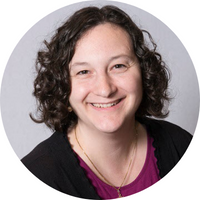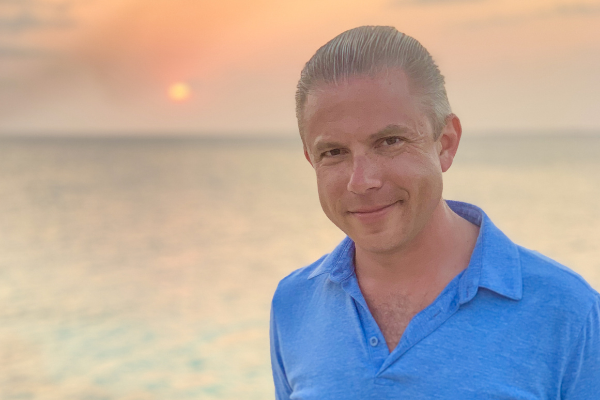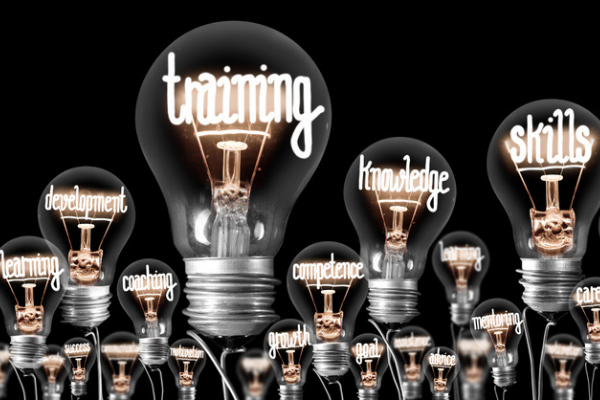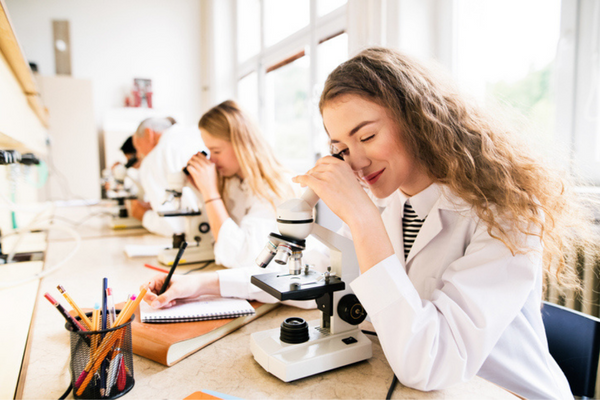
In an ACS-produced What Chemists Do video, you stated that while in your senior year in high school, you realized that, “I think more like a chemist than I think like a biologist.” Can you elaborate on what you meant?
I realized that when I think about problems, I see moving molecules—vibrating, sticking to other molecules or surfaces, or breaking apart. I envision cells as mini chemical factories and biological processes in terms of equilibriums. I see DNA and proteins as polymers. While most biologists will tell you I am not “wrong”, they usually visualize the same problem a little differently.
You spent about seven years working in academia, and you are closing in on 10 years in industry. What’s the profile of someone who will thrive in academia? How about in industry?
As time progresses, it seems that the differences between industry and academia are diminishing. The opportunities in both industry and academia seem to be more varied than in the past. While “industry” used to mean working for a large multinational company, many people in industry now work for small biotech, niche Contract Research Organizations (CROs), and startup companies. These are very similar to being in academia in that you have to wear many different hats—from finding funding and managing finances, to managing people, to conducting top-notch research.
Similarly, you may think “teaching” is something only for an academic; in reality, industrial chemists are also teachers. Industrial chemists may teach peers at other companies how to use their technology or may be teaching and mentoring other scientists. As an industrial chemist, you may also work closely with academic research labs and grad students to complete part of your projects.
Ultimately, what makes people thrive is passion and genuine interest. If you are curious and interested, you usually want to learn more. That desire to learn usually helps you to gain insights that others may miss, resulting in your success. Whether you are in academia or industry, don’t forget to learn outside your area of expertise. Ask questions about how the technology might be used by others, who are you ultimately trying to help, and what adjacent fields might be doing to address the same problem.
I often hear academic chemists say that they are not making a product, but some of the most successful academic chemists develop tools and methods (“products”) for the academic community—a very valuable addition to the chemical enterprise.
If you are someone who enjoys a more varied work load—ordering supplies, conducting the safety reviews, planning the experiments, and teaching others—you might equally enjoy working in academia or a small company. If you really like to focus on one area of chemistry and collaborate with others for the parts you aren’t as well versed in, working for a large multinational chemical company might be a better fit.
After the seven years with Cornell and University of Wisconsin-Madison, what prompted you to investigate a position in industry?
I love research and the opportunities it affords to learn. The professor and grad students I worked with at Cornell were amazing teachers in synthetic organic techniques. I was fortunate to have a project at UW Madison with a purpose; we were trying to find ways of controlling infectious microbes while circumventing problems associated with antibiotic resistance. I enjoyed my time in the research labs at both Cornell and UW Madison, but I wanted a more direct link to creating products of value.
I admit the thought of a better work life balance was also on my mind at that time. In retrospect, I am not sure who actually has a better life work balance. It really depends on the job description.
How did you benefit from your internships at Wyeth and AstraZeneca?
I am very thankful for the opportunities to have internships at both Wyeth and AstraZeneca. My internship at AstraZeneca had a very direct impact on my decision to attend graduate school. I worked in a quality assurance lab associated with a manufacturing facility. After realizing that routine testing was a major part of what bachelors level chemists were able to do, I decided that I wanted to do something more varied with my life. I have since realized that there are a lot more job opportunities for bachelor level chemists than what I saw in that small portion of AstraZeneca.
There was also a chemist at AstraZeneca that was incredibly innovative, despite what I considered to be a very routine job. He taught me that you can bring significant benefit through innovation at all levels and job tasks.
My internship at Wyeth was also incredibly valuable because it taught me the importance of soft skills. At that point, I thought the best path to success was to focus on running as many reactions as possible. Part way through I was given the feedback that part of the goal of the internship was to learn about different career paths and projects that the scientists were working on; having lunch in the cafeteria was a valuable networking time.
After that feedback I learned a lot more about the world of pharmaceutical chemists. I was also able to get some really important feedback from the scientists I met there when I was deciding on graduate schools. I frequently think of an analytical chemist there that would tell me “Never rush when you are in a hurry.” That used to drive me crazy, but I have come to learn that he is completely correct. Rushing leads to mistakes that can be costly in the end.
What is the one personality trait that has been most instrumental in your career success? What trait do you wish you had in greater supply?
While my love of learning and curiosity about problems has been very helpful to me, I think my ability to see what problems, challenges, and new ways of thinking might arise in the future might be my most instrumental trait.
Many successful people that I admire are able to give talks to large audiences and make it seem like a personal conversation. The trait I wish I had in greater supply is flawless public speaking. I am continuing to work at it, especially incorporating humor into my talks, and have previously joined ToastMasters.
What particular problem or challenge at the interface of chemistry and biology most intrigues you?
I am super interested in learning how we can leverage chemicals produced by plants and microbes. I have been very interested in this since freshman year at Cornell when I joined a crop and soil science lab looking at how sugars from sweet peas could help with diabetes. I am really fortunate to be learning about chemicals produced by microbes and how they might be useful in home and personal care products currently.
Based on your experience at Dow and DuPont, what advice would you give chemistry undergraduates when it comes to taking business classes while in school?
I have never taken any formal business classes myself. I have been fortunate to learn from coworkers in more business focused roles. However, I would have benefitted from some formal training in marketing, specifically around conducting voice of the customer surveys and the best practices around calculating new project Net Present Values (NPV).
What non-technical skills have you most relied on to-date for your career advancement?
I picked up one really good piece of advice in the “Engaging and Motivating Volunteers” Leadership Development Course—spend the time to develop a job description for your volunteer need and include the amount of time you think it will take to realistically complete it. Taking the time upfront to think carefully about what your asking for means that you more often get what you need; when people accept they know what they are getting themselves into, and they know you are not going to waste their time. Since many of the projects I work on are very early stage, I often need a few “volunteers” to test out hypotheses. While they are employees at the same company, in many ways they are volunteering their time on top of other projects.
You have contributed many, many hours of time in several ACS volunteer roles. What motivates you to do so?
It might sound really strange to some people, but finding safe places to grow without the fear of failure has been a key part of my volunteer activities. Every volunteer activity offers the opportunity to learn and gain wisdom on how to do something, and many of these opportunities have parallels in my “real” job. I appreciate the opportunity to learn and take risks that I might not take in my job because I think it ultimately makes me a better volunteer and a better employee.
What have you learned about yourself since the start of the pandemic?
I generally think of myself as someone who doesn’t need a lot of structure. However, I realized that some structure is a good thing. I also realized how much I look forward to spending time with family and friends, many of whom I need to travel to visit. While I am I fine with delayed gratification, I realized that delaying something to a defined time in the future is very different than delayed to an indefinite time that will hopefully happen in the future.
Many may not realize you earned the Girl Scout Gold Award. What community issue did you address to earn the award? And where is the Gold Award pin the Girl Scouts gave you to recognize the achievement?
I worked on building a more direct trail to a soccer field through one of the Town’s conservation areas so that grandparents and others who wished to cheer players on could more easily access the field. The previous trail to the field was quite long and over uneven terrain. I also created a field guide to the plants and animals found in the conservation area that was added to the local library. Finally, I led several workshops on making bird houses to provide nesting sites for birds that might have been disturbed during the process of building the trail.
After losing my Girl Scout Silver Award on a campout and having to try to get a replacement, my Gold Award is very securely sewn on to my Girl Scout Vest and safely stored in the top drawer of my dresser.
Let’s end on a little bit of football. As a fan of the New England Patriots, what’s your assessment of Tom Brady – who after 20 years and 6 Super Bowl victories with the Patriots – left the team to join the Tampa Bay Buccaneers? Ungrateful wretch? Or ‘heck, he’s earned the right?’
Let’s just say I am the disappointed parent in this situation. He is a “big boy” and can make his own decisions, but I would have thought he would have chosen to stay only with the Pats until he retired.
About the Contributor
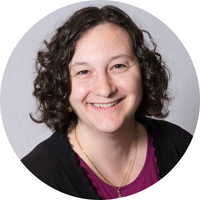
Christine (Christie) McInnis is Principal Investigator and Team Leader at International Flavors & Fragrances. She loves working at the discovery end of the innovation pipeline and has previously led new business development efforts and the R&D Microbial Control Water Platform. Christie also has experience as a customer application specialist responsible for technical support and development of biocides in water treatment and metalworking applications at Dow Microbial Control. She looks forward to joining IFF in Q1 2021.
Christie joined Dow Chemical after earning her PhD in organic chemistry from the University of Wisconsin-Madison. She also received a dual BA degree in chemistry and biological sciences from Cornell University, Ithaca, New York.
Christie enjoys being involved in several ACS committees and organizations. She has a passion for advancing the causes of younger chemists leading her to volunteer with younger chemists at both the local and national levels. As an ACS Career Consultant, Christie helps people find and prepare for careers they thoroughly enjoy. She has led alternative career days, the YCC track of the Leadership Development Institute, and serves as a councilor from Philadelphia serving on the Committee on Economic and Professional Affairs. Christie has also served on the Multidisciplinary Program Planning Group (MPPG; chooses the national meeting themes) for several years, ultimately chairing MPPG in 2020. She is excited to chair the Philadelphia Local Section in 2021.
Copyright 2020 American Chemical Society (All Rights Reserved)
This article has been edited for length and clarity. The opinions expressed in this article are the author's own and do not necessarily reflect the view of their employer or the American Chemical Society.

